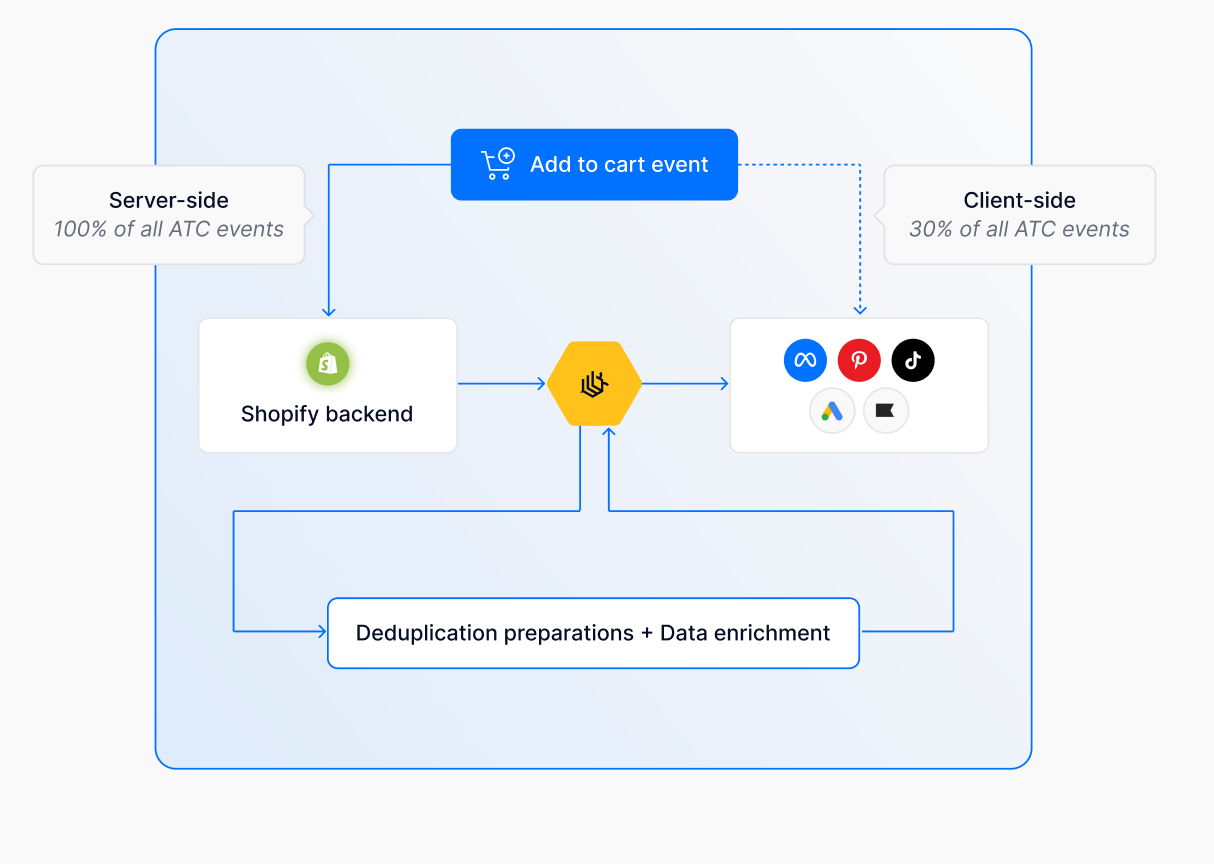Configuring various functionalities within a web container in Google Tag Manager, such as creating variables and managing tags, is essential for implementing tools like the Facebook Conversion API for enhanced tracking and advertising campaign performance.
Well, it's essential if you're not familiar with TrackBee yet. More on that later!

The hidden gap in your ad tracking
Major ad platforms like Meta and Google Ads recommend implementing both browser and server events together, yet most marketers aren’t taking full advantage of this approach. The standard tracking pixel alone isn’t enough anymore - you need a comprehensive strategy that includes:
- Client-side tracking - Traditional tracking through pixel events in your website’s browser
- Server-side tracking - More reliable data collection through server event connections via the conversions API
Learn more about the differences between client-side and server-side tracking
Your standard tracking pixel might be missing up to 30% of important conversions due to browser limitations, privacy settings, and other technical challenges. This is why you also need server-side tracking for reliable and complete data collection.

Why proper deduplication matters
When implementing both tracking methods, you’ll inevitably generate duplicate events from the same user actions. For example, a purchase event might be tracked by both your Meta pixel and your server-side tracking implementation. Properly tracking and managing conversions for purchase events is crucial to ensure accurate deduplication and prevent attribution inaccuracies in campaign performance.
To uniquely identify and differentiate between similar events, the event_id parameter should be used in data tracking systems.
Major ad platforms like Meta don’t like duplicate events, since it messes up their algorithm.
Without proper deduplication, the confusion of the algorithms lead to:
- Inaccurate reporting
- Bad optimization
- Wasted ad spend

Server side tracking: the missing piece
Server container implementations have become increasingly crucial as browser tracking faces more limitations. The Conversion API provides several key advantages:
- Reliable and complete data collection - Server event tracking isn’t affected by ad blockers or browser restrictions
- Improved event data quality - Send richer user data directly from your servers. Also enrich data over time by using tools like TrackBee, who use advanced shopper profiles.

- First event capture - Track actions that occur before the pixel loads
When properly implemented, server side tracking gives you a more complete view of multiple events in your conversion path. It is crucial to emphasize the importance of deduplication in tracking conversions across both app events and web environments.
Learn more about server-side tracking

The challenge: implementing both the Conversion API and tracking pixel events together
Despite the clear benefits, many businesses struggle with setting up a proper event tracking system that combines both approaches. The technical challenges include:
- Ensuring consistent event data formatting across both tracking methods
- Creating a robust system to deduplicate events
- Maintaining unique event identification across platforms
To effectively manage these challenges, it is essential to enable deduplication for tracking user events across different integrations, such as Pixel and CAPI. This involves forming sessions based on event timing and determining which integration type provides the most valuable data.
To address these challenges, it is crucial to implement specific code that enhances event tracking and tackles issues such as event deduplication. Utilizing a deduplication method is vital for advertising performance optimization, ensuring that overlapping events from different sources, like the Conversions API and Meta Pixel, are correctly identified and processed to avoid counting duplicate events.
Coordinating these elements requires significant technical expertise. Quite a lot actually. And I know, that doesn’t sound too motivating at all. But I’ve got a solution. Read on!

The 5-minute solution for dual-tracking methods & event deduplication
This is exactly why we built TrackBee. We recognized that while using both tracking methods provides substantial benefits, the technical implementation hurdles around duplicate events were preventing many businesses from taking advantage of it.
Our platform seamlessly handles API events alongside browser-based tracking, with automatic event deduplication built in. In just 5 minutes, you can set up the complete tracking system that works with all major platforms — no technical skills required.
It’s easy:
- Create a free TrackBee account
- Connect your Shopify store(s)
- Connect your Ad Platforms
And that’s it! You’re live and we will immediately start working on collecting 100% accurate and enriched data. Good job!

Are you missing valuable data?
If you’re only using one tracking method right now, you’re almost certainly missing data from important user actions. Our analysis shows that implementing both facebook event tracking methods typically identifies up to 30% more conversions. Additionally, it is crucial to prevent double counting when using both the standard pixel and a Conversion API to ensure accurate event tracking.
Think about it — nearly a third of your customer interactions might be invisible to your current setup. That’s a substantial amount of data that could transform your campaign performance. Managing duplicates is essential to avoid counting the same events multiple times, which can occur when identical events are shared across sources. Try TrackBee for free!

Next steps for better event tracking
Take a moment to check your current tracking implementation. Are you using both the Meta pixel and conversions API together? Have you implemented a reliable deduplication system? If not, consider how much time this will cost you and try TrackBee for free. Everything will be settled in less than 5 minutes.
Your competitors might already be capturing this additional data with use of two tracking methods and proper deduplication. Can you afford to make decisions based on incomplete information?


.png)





.svg)
.svg)

.png)
.png)

.png)
.png)

.png)

.png)



